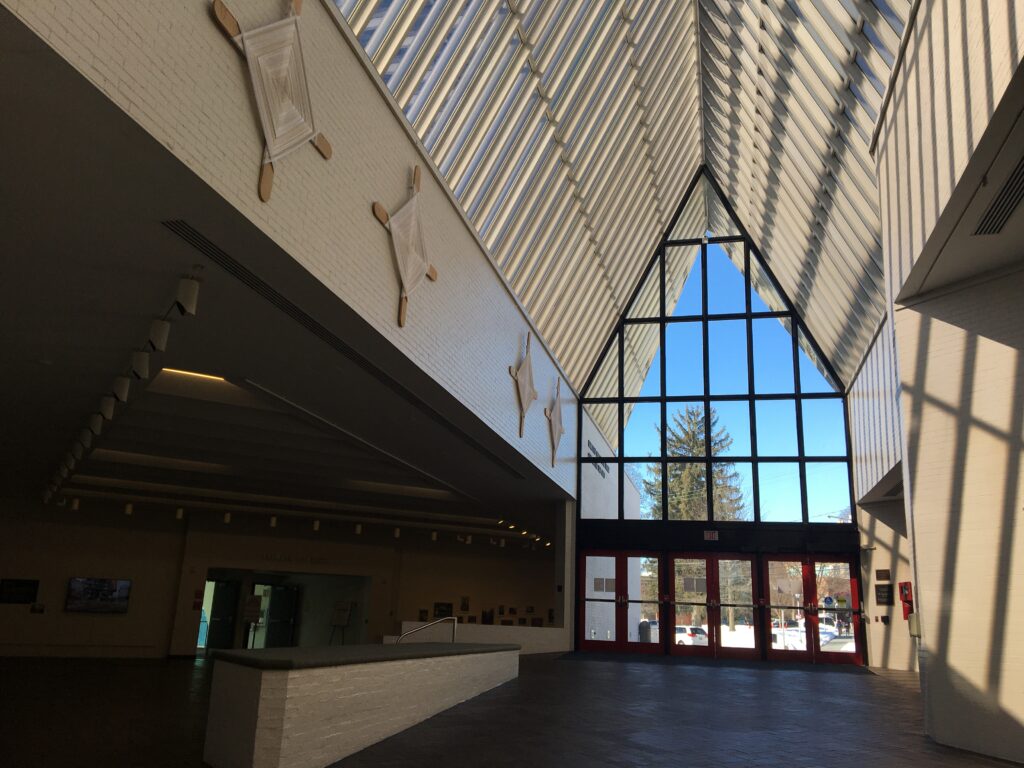Students are giving it their all as they try to navigate academics as well as their roles within vocal ensembles this semester. As Christopher Jackson, PhD., assistant professor and director of Muhlenberg’s vocal ensembles, says, “The students who made the decision to stay [in vocal ensembles] are taking the initiative. Those students have stuck with it and they’ve been incredibly optimistic and focused.”
Students are not the only ones who have had to adjust to this new format of learning, as Jackson explains how his role as a conductor has changed. “It’s different in-person than it is virtually. The role of the conductor virtually is almost silly. Because what I have to do for some of these projects is record myself conducting”
There have obviously been some challenges that have arisen since the implementation of this new learning format. Jackson gave some insight into the problems that are specific to his vocal ensembles and how they are dealing with it. “So, last semester we did a lot of virtual choir projects… We definitely had to get used to [changes]. I asked the students to stand when they recorded, but if they were using microphones…, the way a lot of singing techniques work— whether its musical theatre, or more classical music or other techniques or genres— you can’t sing like you’ve got a mic two inches from your face, you have to pretend like you’re not in your room.”
Not everything involving virtual learning and performances is bad, as Jackson notes some of the unforeseen benefits that have come from this new format of learning, practice and performance. “I think every challenge that something presents is an opportunity to learn something or to overcome something… Students are really self-directed right now, I’ve had students report to me that they realize now so many more of the things they need to get better at. Everybody’s become, I think, a lot more independent which is a really interesting and good thing.”
Exam season is also a major concern for students both on and off campus. When that time comes around there are plans for certain instances involving time management. Jackson explains, “I had to take a really good look at what role choir plays in the life of the campus. [It is] taken by people because people enjoy it, because people want to learn more about music or experience music in some way. If I were to ask myself what I can do to serve the students here at Muhlenberg, it would be to push them as I can, to still hold them to good expectations and to challenge them so that they learn and grow, but also to be flexible. I have scheduled a couple of extra days off throughout the semester. I’ve scheduled some things that are easier for people to work on at their own pace, and my hope is that when we approach these busy points in the semester I can allow students to really do what they need to do to still have a quality experience and get the most out of their semester.”
When asked about how he and his students use vocal ensembles to handle this semester and the difficulties we’re bound to face in the future, Jackson said, “I think the other thing that’s important for us right now is I’m also really trying to do new music with students. What I mean is music that has literally been composed in the last year, because it really feels like it matters…I don’t just want to show up and sing things together even though that act itself is good and beautiful, but I want to put music that’s relevant in the hands of students. Some of the stuff we’re working on now were pieces that were composed because of the pandemic. We want to use art to approach life directly, not art from another era, not art from another time or genre.”
Jackson elaborated on how he plans to approach this semester’s challenges versus how he handled and approached last semester, as well as what he and his ensembles have planned, “Last semester we did everything virtually. We tried to meet outside for a few weeks and found it a little challenging in certain ways, then went completely online. And it worked so well… But this semester I can feel that we are virtual-project-ed out, we don’t want to just keep diving into that time after time. So, what I’ve asked the students, and they’ve agreed, is that as soon as daylight savings time hits, March 14, we are all gonna go outside and make something happen.”

